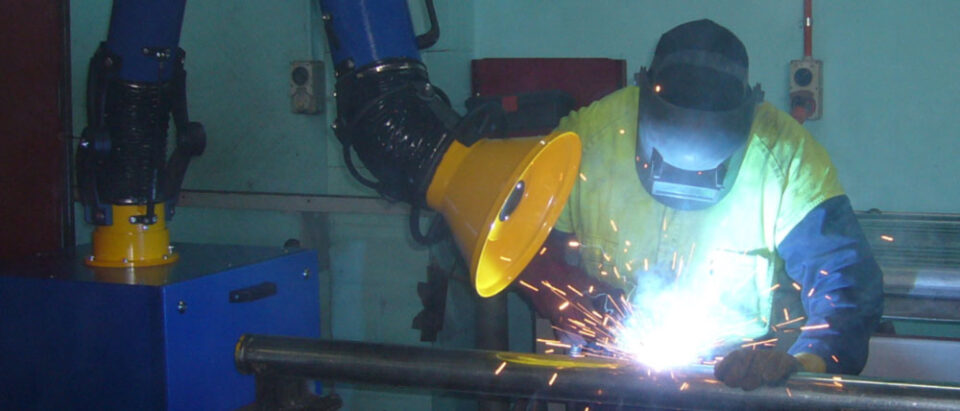Welding fumes pose significant health risks to workers, including respiratory issues, metal fume fever, and even long-term conditions such as cancer. Effective control measures are crucial for minimising exposure and ensuring a safe working environment. In this blog, we’ll explore various strategies to control welding fumes, the role of ventilation, and how Fanquip products can help achieve a safer workspace.
Strategies to Minimise Welding Fume Exposure
Reducing exposure to welding fumes requires a combination of approaches, often referred to as the hierarchy of control. This hierarchy prioritises eliminating the hazard, followed by substitution, engineering controls, administrative controls, and finally, personal protective equipment (PPE).
- Elimination and Substitution: The most effective way to control welding fumes is to eliminate the welding process altogether or substitute it with a less hazardous process. This might involve using alternative joining methods that do not produce fumes or selecting materials that generate fewer harmful emissions when welded.
- Engineering Controls: When elimination or substitution isn’t possible, engineering controls, such as local exhaust ventilation (LEV), are the next best option. LEV systems capture fumes directly at the source, preventing them from spreading into the breathing zone of workers. On-gun fume extraction and forced dilution ventilation are also effective in specific situations.
- Administrative Controls: Implementing procedures and work practices that reduce exposure, such as regular equipment maintenance, training workers on safe practices, and rotating tasks to limit the duration of exposure, can significantly reduce risks. Monitoring air quality to ensure compliance with exposure standards is also critical.
- Personal Protective Equipment (PPE): PPE, such as powered air purifying respirators (PAPRs) and welding helmets, provides a crucial layer of protection. However, PPE should be used as a last resort or in conjunction with other control measures, as it does not eliminate the hazard.
What is the Most Efficient Method of Controlling Welding Fumes?
The most efficient method for controlling welding fumes involves a combination of proper ventilation and the use of appropriate PPE. Specifically, local exhaust ventilation (LEV) systems are highly effective in capturing and removing fumes at the source. This method is preferred because it directly prevents harmful particles from entering the breathing zone of workers.
The use of welding helmets equipped with PAPRs further enhances protection by filtering out dangerous fumes and providing a continuous supply of clean air. This dual approach not only meets health and safety regulations but also ensures that the workplace exposure standards for airborne contaminants are not exceeded.
How Does Ventilation Affect Welding Fumes?
Ventilation plays a crucial role in controlling welding fumes and ensuring air quality in the workplace. Proper ventilation systems help dilute and remove airborne contaminants, reducing the concentration of hazardous fumes.
Types of Ventilation:
- Local Exhaust Ventilation (LEV): LEV systems are the most effective for welding fume control, capturing fumes directly at the source using capture hoods and extraction arms.
- Forced Dilution Ventilation: This method involves using fans to introduce fresh air into the workspace, diluting the concentration of fumes. It is particularly useful in large workshops and factories.
- Natural Dilution Ventilation: This relies on natural airflow through open doors and windows to disperse fumes, suitable for outdoor or well-ventilated indoor spaces.
Proper ventilation not only protects workers from adverse health effects but also ensures compliance with Safe Work Australia guidelines and workplace exposure standards.
Fanquip Products for Welding Fume Control
Fanquip offers a range of products designed to effectively manage welding fumes in industrial settings. These solutions cater to various needs, from portable units to comprehensive ventilation systems.
Fume Extractors
Fanquip’s fume extractors are essential for protecting workers’ respiratory health in environments such as service and repair workshops, manufacturing centres, and laboratories. They are designed to efficiently capture and remove airborne particles, including welding fumes, grinding dust, and other contaminants.

Mobile Fume Extractor
The Mobile Fume Extractor is designed for heavy industrial use, capturing welding fumes and other airborne particles. It offers flexibility with its adjustable arm and ease of movement due to large wheels. Key features include:
- 160mm dia 3000mm long articulated fume arm/s
- F9 main cartridge filter
- Heavy-duty castors
- Metal mesh prefilter for sparks
- Premium powder-coated steel casing
These products are designed to meet the highest standards of workplace health and safety, providing effective control measures to minimise exposure to harmful welding fumes.
Portable Blower Extractor
Ideal for ventilating confined spaces and extracting hazardous fumes, the Portable Blower Extractor is lightweight and portable. It features:
- 5m length of heavy-duty flexible ducting
- Aluminium carry frame
- Impact-resistant polyethylene moulded casing
- IP55 Motor
- Plastic moulded capture hood for increased suction area

Case Study: Yurra Industrial Cleaning Services
Problem
Yurra’s diverse array of cleaning solutions includes maintaining safe environments in challenging industrial settings. At an oil production workshop, the need to eliminate harmful fumes, excessive heat, and contaminants was critical to ensuring a clean and safe workspace.
Solution
Fanquip provided a single Mobile Fume Extractor, which was sufficient to meet the workshop’s extraction needs. This efficient solution offered controlled ventilation, effectively maintaining optimal air quality throughout the facility. The implementation not only ensured a safer working environment but also highlighted Fanquip’s capability to deliver tailored, effective ventilation solutions for industrial applications.
Get Expert Advice for Industrial Ventilation Solutions
For businesses aiming to reduce exposure to welding fumes and comply with health and safety regulations, expert advice is essential. Fanquip offers comprehensive industrial ventilation solutions tailored to the needs of various industries. Whether it’s through powered air purifying respirators, local exhaust ventilation systems, or portable fume extractors, we help ensure a safer working environment.
For more information on how Fanquip can assist you in achieving compliance and protecting your workforce, contact us today. Let’s work together to create a safer and healthier workplace.
